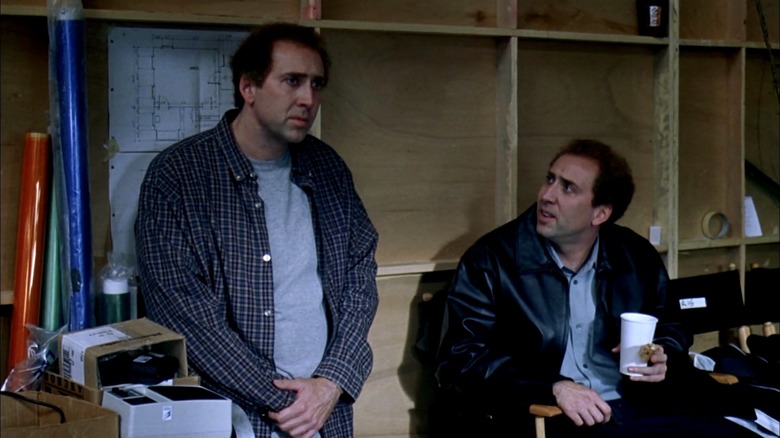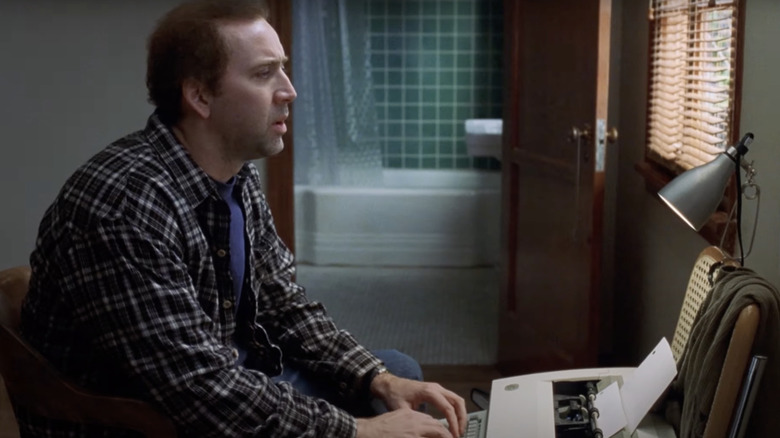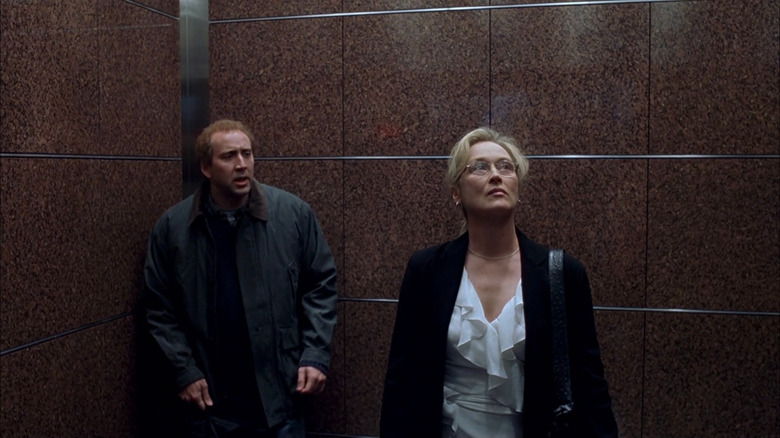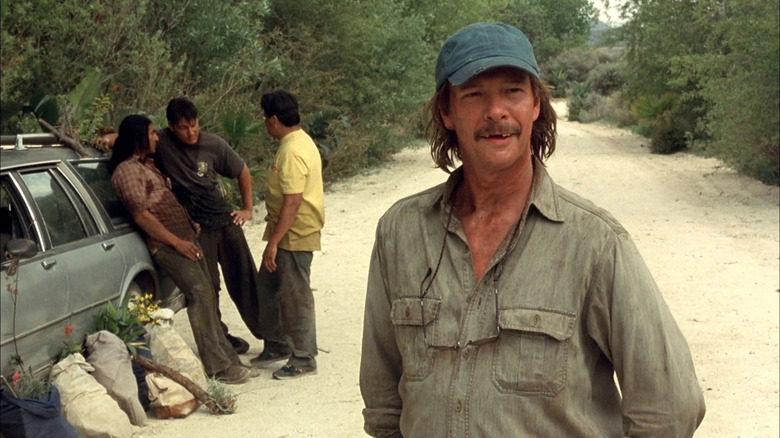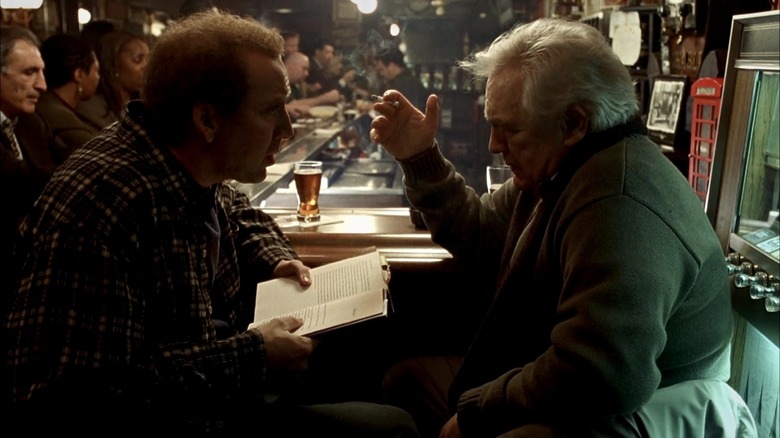The Daily Stream: Adaptation Is A Way Of Life
(Welcome to The Daily Stream, an ongoing series in which the /Film team shares what they've been watching, why it's worth checking out, and where you can stream it.)
The Movie: "Adaptation"
Where You Can Stream It: Hulu
The Pitch: Charlie Kaufman, played by Nicolas Cage, writes himself and his fictional twin Donald into his screenplay as he adapts Susan Orlean's nonfiction book "The Orchid Thief."
"The Unbearable Weight of Massive Talent" isn't the first time we've seen Nicolas Cage play a real person or act opposite himself. A new 4K Ultra HD release of "Adaptation" came to Blu-ray and DVD last month as the Oscar-winning 2002 film was celebrating its 20th anniversary. That's as good an excuse as any to revisit director Spike Jonze and real-life screenwriter Charlie Kaufman's pivotal follow-up to "Being John Malkovich."
"Adaptation" is a dramedy so dense and meta that some scenes even take place on the "Being John Malkovich" set, where we see how Cage's nouveau-shamanic version of Charlie lurks on the periphery of the Hollywood ecosystem. Voiceovers let us listen in on his inner monologue. It's the first thing we hear as the writerly, Courier-font credits — complete with a punctuation mark after the title — appear and Charlie's neurotic murmurs blow over a dark screen like the breath and word of God.
That's a fitting way to begin a movie about the evolutionary process of creativity and life itself. As the titular orchid thief, John Laroche (Chris Cooper) puts it, "Adaptation's a profound process. It means you figure out how to thrive in the world."
For Charlie, that world just happens to be Hollywood. (Don't call it the "industry.")
Why it's essential viewing
I would say "Adaptation" is required viewing for any aspiring writer, but that automatically narrows its audience down, and this is a movie with themes that extend to all walks of life. The funny thing is, John Cusack cameos in the film, and in addition to predicting the plot of his 2003 thriller "Identity," "Adaptation" does what Terrence Malick's "The Tree of Life" did years before it was a twinkle in any moviegoer's eye. It shows how the origin of life, the extinction of the dinosaurs, and four billion and forty years of evolution have all been leading up to the existence of one sweaty, balding, anxiety-ridden man.
As Charlie wrestles with adapting a book about flowers — a book without a story — he wants to just keep it about flowers and not sexy it up with drugs or car chases. Yet before the movie is over, we may see some of that. His happy-go-lucky twin, Donald, a living "Casablanca" tribute, decides to write his own script full of overused ideas like serial killers and dissociative identity disorder.
With his own adaptation, Charlie's determined to "let the movie exist rather than be artificially plot-driven." He calls out cliches like characters breaking out in pop songs, then sets about breaking his own rules because, at the end of the day, there really are no rules to break, just guidelines.
As Charlie's unwieldy adaptation balloons into something that will "tie all of history together," it becomes the very opposite of one that's secretarial, with him putting more of himself into it and making it a personal thing. At times, he works himself up into a state of creative hysteria, only to sober up later and shake his head in grief as he listens to his own recorded ramblings.
Seeding structure
As it alternates between scenes of Charlie's life and "Orchid Thief" vignettes with Cooper and the great Meryl Streep as Orlean, "Adaptation" blurs the lines between fiction and reality. Charlie dictates scenes we've already seen into a tape recorder, while Jonze and Kaufman also interweave his own sad-sack sexual fantasies, which put him in bed with Orlean and Tilda Swinton's studio executive and out in the back woods with Judy Greer's chipper waitress character as she disrobes.
Donald, meanwhile, attends screenwriting seminars and talks of structure, laying the proverbial orchid seeds for Charlie to later adapt and strike the perfect balance between drama and thrills in his own script. Though "Adaptation" has a free-form flow and feel to it, some of its inner workings are on open display, and if the viewer could see them all, they would probably marvel at how it's a Swiss watch, structurally.
It's an obvious wink when Charlie and Donald talk about two movie characters being the same person and how it could be accomplished with trick photography, right before "Adaptation" itself employs trick photography to make it look like Cage is sitting down on the bed with his own twin. Less noticeable, perhaps, are little things like when a scene with Charlie's date getting out of the car with him leads directly into one of Orlean getting into the van with Laroche.
'You know why I like plants? 'Cause they're so mutable'
In "Adaptation," the orchid hunter's search for an elusive "ghost orchid" becomes a symbol of all that's unattainable, including the very notion of happiness for Orlean. Seeing scenes unfold in plant nurseries and on Florida state roads reminded me of where I grew up.
At one point, I put the movie on pause and looked up my dad's old sod business on Google Maps. There's a sign out front now that reads, "Orchids, Orchids, Orchids." Like Laroche, I also lived through Hurricane Andrew and once chipped my front teeth in a car accident.
I could also relate to Laroche's tendency to develop a strong hobby or fixation with something like tropical fishes, then renounce it before moving on to the next obsession. In a way, movies themselves are one of those obsessions for me, and I just happen to stick with this one to where it's now a full-on job like that of "pop-culturist" rather than a horticulturist. A line that's always stayed with me is the one where Orlean wonders aloud whether "the reason it matters to care passionately about something is that it whittles the world down to a more manageable size."
Another highlight in "Adaptation" is the scene where future "Succession" star Brian Cox pulls up a stool onstage as screenwriting guru Robert McKee. In a stentorian voice, he proceeds to harangue Charlie for daring to waste the audience's time with a movie where nothing happens and there's no "story" (that being the all-important, one-word title of his screenwriting manual). "God help you if you use voiceover in your work, my friends!"
'Then what happens?'
Kaufman has continued to do interesting work in the 2020s with Netflix's "I'm Thinking of Ending Things," a movie that works a little better, maybe, when you understand its profound ending. In its own third act, "Adaptation" becomes a late-blooming thriller, not unlike the one Donald is writing (minus the serial killers). The film zigzags into some plot twists that might seem sensational but make more sense if you think of it as an extension of Charlie himself adapting to Hollywood's storytelling needs.
That's part of his arc, and if a guy who's as much of a headcase as him can adapt, maybe there's hope for us all. There's a scene before the end where McKee sits across from Charlie at a bar after one of his seminars, listening as Charlie reads the final line of Orlean's book:
"Life seemed to be filled with things like the ghost orchid—wonderful to imagine and easy to fall in love with but a little fantastic and fleeting and out of reach."
"Then what happens?" McKee asks. It's the perfect bar stool reaction, one that might be familiar to anyone who's ever had to deal with how unimpressed the world was at an impractical dream of theirs. For a writer, this is where the rubber meets the road and they're forced to contend with how to tell a story that will be worth the audience's time—good enough, ideally, to regale even a listener in a bar conversation.
"That's not a movie," McKee says of Orlean's book about flowers. "You gotta go back. Put in the drama." It's a challenge the movie accepts. The challenge anyone and everyone might face in 2023 is how best to adapt ourselves to the biosphere outside our own chaotic heads.
